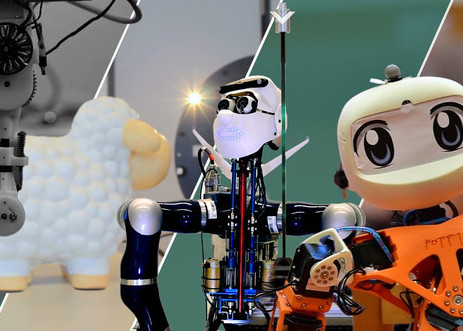MPI for Intelligent Systems continues video series
Video No 4 is now available
Short films present scientists' research projects in an understandable way
A picture says more than a thousand words, a video more than a thousand pictures. For this reason, we have produced a series of short films that present our researchers, their projects, and their goals. We aim to provide insights into our institute and make the work we do understandable for everyone. Once a month, we will put a new video online, either on our website or our institute's Youtube channel.
Our latest video in the series shows a glimpse of the interesting work carried out by the "Intelligent Control Systems" Max Planck & Cyber Valley research group lead by Dr. Sebastian Trimpe. The Intelligent Control Systems (ICS) group focuses on fundamental questions of future intelligent systems, which are able to autonomously interact with their environment – by perceiving the world, acting according to a goal, and by learning from both. For instance, they investigate how a machine can independently learn new tasks from data – and be reliable, safe and efficient all at the same time. Or they look at how collectives of several intelligent systems can carry out a task together – such as several robots coordinating their motion or autonomous vehicles driving in a convoy. It all comes down to sophisticated decision and learning algorithms, essentially the brain of the intelligent system.
We continue the series with a portrait of the "Autonomous Vision" Max Planck research group lead by Prof. Dr. Andreas Geiger. The Autonomous Vision research group, which is based at the Max Planck Institute for Intelligent Systems in Tübingen and the University of Tübingen, addresses questions related to robustness as well as methods that enable high-capacity models (such as deep neuronal networks) to learn with a small amount of data. More specifically, the group’s research focuses on robust perception for autonomous agents, especially autonomous vehicles. Research activities range from sensor-based perception (3D reconstruction, motion estimation, object recognition) and holistic scene interpretation (3D lane and intersection estimation), to sensor engine control approaches.
The series also features the "Dynamic Locomotion" Max Planck research group, which is led by Dr. Alexander Badri-Spröwitz. He and his team use robots and simulations to understand animals and their movements. They want to investigate why an animal activates a muscle, what forces enable the animal to move or why not all muscles and tendons are the same. The researchers take inspiration from animals to build robot models. The advantage of robots is that the researchers can test the function of the individual parts. Their findings could help to improve walking robots, prostheses or exoskeleton technologies – external support structures for the body.
The series began with a portrait of the "Autonomous Learning" Max Planck research group, which is led by Dr. George Martius. The Autonomous Learning group’s mission is to make robots learn in a way that is similar to early childhood development. If robots learn by interacting with their environment, they may also be able to act in a complex and constantly changing world, which they cannot be programmed to do.
Researchers at the Max Planck Institute for Intelligent Systems strive to understand the principles of perception, action, and learning in autonomous systems that successfully interact with complex environments. In addition to gaining a scientific understanding of natural intelligent systems, the institute’s scientists aim to use such insights to design artificially intelligent systems that could benefit humanity in the future. With campuses in Tübingen and Stuttgart, the MPI-IS combines theory, software, and hardware expertise in a single interdisciplinary center. This enables the pursuit of creative and impactful research in a broad range of connected topics within the thriving research field of intelligent systems.
Videos
Videos
People






